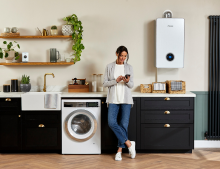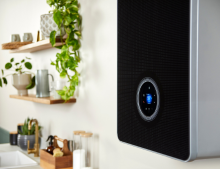A hybrid heating and hot water system is a combination of two or more technologies generating heat together as a low carbon alternative for home heating.

Thinking of switching?
Hybrid systems typically consist of a gas or oil boiler and an air to water heat pump. Hybrid systems can be more flexible than standalone heat pumps to accommodate a wider variety of property types, making them a viable option for less thermally efficient homes, such as period properties - meaning you’re achieving carbon savings immediately while giving yourself a longer period to improve the fabric of your property.
Lead the way to greener heating and find out if your home is right for a hybrid system, by using our simple checker below.
Getting your hybrid installed
1. A quick check
Answer a few simple questions to see if your home is suitable for a hybrid system.
2. Discuss your options
Fill in your details and our expert team will be in touch to discuss your options and arrange a survey.
3. Next steps
Your installer will provide a full quote and arrange your installation.
Hybrid not right for your home?
If a hybrid isn’t the best solution for your home right now, there are plenty of other options to keep your bills and carbon consumption low. Upgrading to a high efficiency and future-proofed boiler may be the right choice for you.

FAQs
How much does it cost to install a hybrid?
The cost of a hybrid heat pump installation will vary significantly based on a number of factors; Is the installation both a new boiler and a new heat pump? The proximity between the heat pump and the boiler Is the hybrid system going to be with a ‘Regular boiler system’ that requires a hot water cylinder and a cold water storage tank or a ‘combi boiler system’ The type of air to water heat pump you require. Whilst hybrid heat pumps can have higher upfront costs than a gas boiler, they are significantly less expensive than a sole heat pump. Installation costs, with a new boiler, can range between £6,750 - £8,500* Retrofitting a hybrid heat pump, 5kW, to an existing boiler system can be significantly cheaper depending on remedial changes required. *Department for Business, Energy & Industrial Strategy, Hybrid Heat Pumps, December 2017
How long do they take to install?
On average a hybrid system can take between 2 to 5 days to install. This depends on the complexity of the system and what the technology configuration is. Though the installation complexity would be significantly reduced when compared to a standalone heat pump. There is also the possibility to retain your heating and hot water supply if the hybrid is being retrofitted onto an existing boiler.
Will gas boilers still be available with a hybrid system?
Despite the rumours, gas boilers are not being banned from 2025. If you buy one now, you’ll be able to use it until the end of its life. You won’t be asked to remove or replace it whilst it’s still working. Even after 2025 you’ll be able to buy a gas boiler although, following trials, they may run on hydrogen. Our boilers are already fitted to be able to run on a hydrogen and current natural gas blend. Our hybrid heat pump system and our gas boilers can provide sustainable heat into your home where the boiler can be converted to hydrogen gas in the future.
What are the advantages and disadvantages of a hybrid system?
Most existing heating systems which are heated by a gas or oil-fired boiler, (circa 24m), have radiators installed that were sized on the basis that the water temperature within was around 75ºC and an external air temperature of -3ºC. They were also sized on the basis that the boiler would be operated intermittently, perhaps for one or two hours in the morning and 4 or 5 hours at night. Outside of these times, the heating system would be switched off with a small number of systems having controls that allowed the air temperature in the house to drop to a set-back temperature 4 or 5ºC lower than the comfort temperature (which is typically 21-22ºC). If the setback temperature is reached then the boiler will fire and keep the house at this set-back temperature until the next demand for the higher comfort temperature. Consequently, there are many occasions where only putting air-source heat pump water temperatures, (40-45ºC) into radiators sized for temperatures more like 75ºC will result in lower room air temperatures being experienced and discomfort and perhaps secondary heating devices needing to be used with more carbon being emitted. Conversely, there will be moments in the year when the outside air temperature is higher than the design temperature basis and the required room temperatures will be achieved by the lower fl ow temperatures of a heat pump, with no noticeable drop in heat pump efficiency. Typically with anything over around 7ºC external air temperatures, it is likely that the heat pump will be suitable for the existing radiators to achieve the desired room temperatures and therefore with the lowering carbon intensity of electricity generation, a worthy consideration for carbon reduction measures. A major advantage of a hybrid system is the reduced alterations needed to an existing heating and hot water system and the property itself. To substitute a gas or oil-fired boiler totally with a heat pump is likely to require improvements to the fabric of the house to reduce the heat loss and also make the existing radiators and pipework suitably sized for the lower water temperatures. Also and perhaps more significantly there are around 17 million homes with combi or combination boilers installed and therefore no hot water storage cylinder. To remove a combi and replace it with a heat pump would require a hot water storage cylinder to be installed and a location for it found, and in most cases this will mean taking a portion of the landing or one of the bedrooms and constructional work to facilitate this. As you can imagine there will be very few people happy to accept this requirement. Using a hybrid heat pump system would allow the heat pump to be sited externally and no or very few remedial changes are required to the heating and hot water system or the property. The boiler would heat the house during the colder periods and, when the weather isn’t quite so cold, yet heating is still required, a combi can provide hot water whilst the heat pump warms the property.




